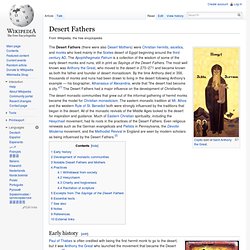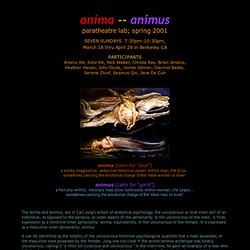

Desert Fathers. The Desert Fathers (there were also Desert Mothers) were Christian hermits, ascetics, and monks who lived mainly in the Scetes desert of Egypt beginning around the third century AD.

The Apophthegmata Patrum is a collection of the wisdom of some of the early desert monks and nuns, still in print as Sayings of the Desert Fathers. The most well known was Anthony the Great, who moved to the desert in 270–271 and became known as both the father and founder of desert monasticism. By the time Anthony died in 356, thousands of monks and nuns had been drawn to living in the desert following Anthony's example — his biographer, Athanasius of Alexandria, wrote that "the desert had become a city. "[1] The Desert Fathers had a major influence on the development of Christianity. The desert monastic communities that grew out of the informal gathering of hermit monks became the model for Christian monasticism.
Early history[edit] Development of monastic communities[edit] Practices[edit] Hesychasm[edit] The Anima/Animus Lab. Anima -- animus paratheatre lab; spring 2001 SEVEN SUNDAYS 7:30pm-10:30pm, March 18 thru April 29 in Berkeley CA PARTICIPANTS Antero Alli, Sylvi Alli, Nick Walker, Christa Ray, Brian Jenkins, Heather Hanan, John Doyle, Jonnie Gilman, Diarmid Baillie, Serene Zloof, Seamus Qin, Jane De Cuir anima (Latin for “soul”) a wildly imaginative, seductive feminine power within man; the Eros... sometimes carrying the emotional charge of the 'ideal woman or lover'. animus (Latin for “spirit”) a fiercely willful, visionary masculine luminosity within woman; the Logos... sometimes carrying the emotional charge of the 'ideal man or lover'.

The Anima and Animus, are in Carl Jung's school of analytical psychology, the unconscious or true inner self of an individual, as opposed to the persona, or outer aspect of the personality. "Our approach to anima/animus is not psychological nor is our intention, psychotherapy. Relevant links. The Alchemy Web Site. Meditation is easy. Dream Analysis and Interpretation, doing it! [ | HOME | Personal Introduction | Dream Analysis | Basics about Dreaming | Dream Discussion | View The Guestbook | Add to Guestbook | Dream Dictionary | | Dream Central's Unique Method of Dream Analysis A new approach.. It must be made clear from the start that anyone who is interested in remembering their dreams, and understanding them, is free to do so. You are not required to possess any psychic abilities, or prestigious degrees!
Interpreting dreams can be done by anyone willing to simply learn how. Just like learning to drive a car, or tying your shoes hangs with you, this too will be something that in time you will be able to do quite naturally. Dreams are not a way avoid facing your difficulties, in fact you hit them head on. Philosophical Terms and Methods. Ad hoc You call something ad hoc when it's introduced for a particular purpose, instead of for some general, antecedently motivated reason.

So, for instance, an ad hoc decision is a decision you make when there's no general rule or precedent telling you what to do. Philosophers sometimes accuse their opponents of making ad hoc hypotheses (or ad hoc stipulations, or ad hoc amendments to their analyses, etc.). These are hypotheses (or stipulations or amendments) adopted purely for the purpose of saving a theory from difficulty or refutation, without any independent motivation or rationale. They will usually strike the reader as artificial or "cheating. " For instance, suppose you analyze "bird" as "any creature that can fly. " A bird is any creature that can fly, and which is not a mosquito. This would be an ad hoc response to my counter-example. A bird is any creature that can fly, and which has a backbone. Appeals to authority In philosophy, there are no real authorities.
Ad hominem or: vague.